Featured
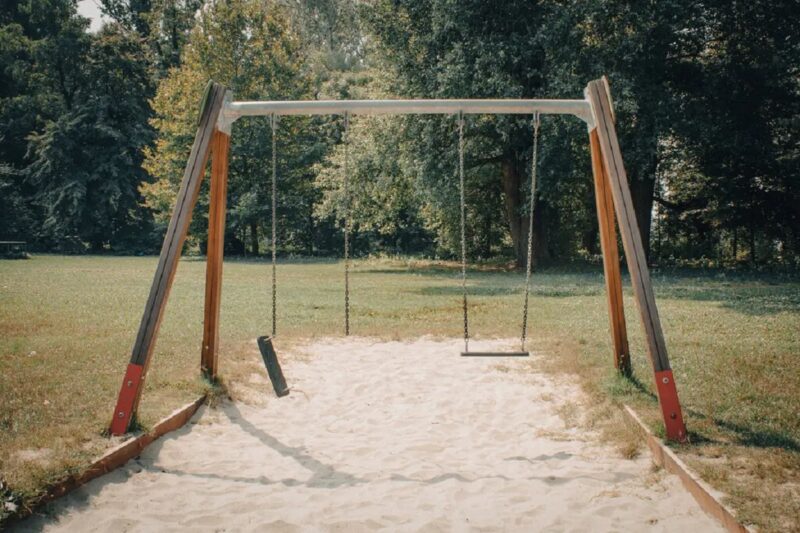 How Can We Be a Country That Does This to Our Children? By Esau McCaulley / NYT
How Can We Be a Country That Does This to Our Children? By Esau McCaulley / NYT
Death is not supposed to visit the lives of our daughters in pigtails or stalk our sons who still have gaps in their teeth.
The killer, who also took the lives of three adults at the Covenant school, was another in a long line of murderers whose ideologies vary as much as the objects of their violence: Asians, African Americans, Black church attendees, members of the L.G.B.T.Q. community, former classmates, moviegoers, grocery shoppers and Christian school students and staff. The one thing that unites these killers is the easy access they had to weapons, owing to the laws that exist in our republic. Read more
Related: What can Australia’s reaction to a mass shooting teach us about guns and gun control? By CBS News
Related: Australia confiscated 650,000 guns. Murders and suicides plummeted. By Zack Beauchamp / Vox
Political / Social
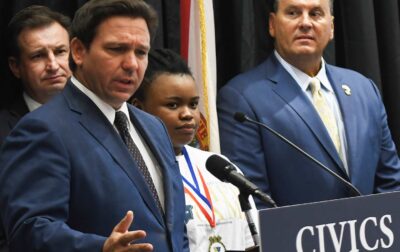 A Dream and a Lie: Ron DeSantis’s Twisted Race Pedagogy. By Anthony Conwright / The Nation
A Dream and a Lie: Ron DeSantis’s Twisted Race Pedagogy. By Anthony Conwright / The Nation
The ultimate aim of the Florida governor’s education platform is to depoliticize actually existing Black history
Florida Governor Ron DeSantis’s legislative crusade against Black history in Florida’s K-12 curriculum is nothing short of a frontal assault on Black Americans’ sense of reality and identity. History in American education is not, as DeSantis suggests, an impartial assemblage of the “cut and dried” facts. It is, rather, the way we test and refine various narratives of our collective identity and national aspirations—and, crucially, interrogate the enabling fictions that make up the American dream. Read more
Related: “Ruby Bridges’ movie under review by Florida school after parent objects the film could teach students that “white people hate black people.” By Nicole Chavez / CNN
Related: “Closed by Order of the Governor”: Teachers in the Crossfire of Florida’s War on Public Education. By Isabela Dias / Mother Jones
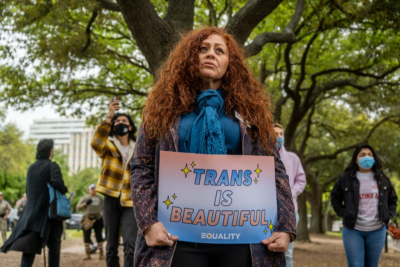 Despite the GOP backlash, ‘wokeness’ is winning. By Eugene Robinson / Wash Post
Despite the GOP backlash, ‘wokeness’ is winning. By Eugene Robinson / Wash Post
Marisol Calvo protests in front of the Capitol on March 20 in Austin, where people gathered to demonstrate against bills in Texas seeking to revoke certain rights and privileges from the LGBTQ community. (Brandon Bell/Getty Images)
“Wokeness” is winning, according to an illuminating new poll that should — but probably won’t — make Republican politicians wary of hitching their wagon to the anger-fueled culture wars. The survey — conducted this month by the nonpartisan research institute NORC at the University of Chicago, with funding from the Wall Street Journal — found that on several hot-button issues related to “wokeness”, substantial majorities of Americans believe our progress toward inclusion and diversity is on the right track. Read more
Related: What the Republican Push for ‘Parents’ Rights’ Is Really About. By Jamelle Bouie / NYT
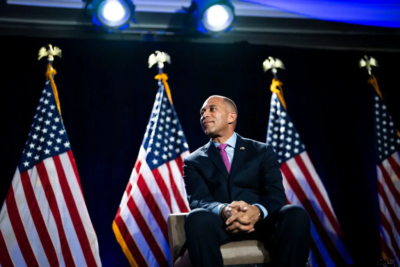 How Big Law and Black Brooklyn Fueled Hakeem Jeffries’s Rise. By Nicholas Fandos / NYT
How Big Law and Black Brooklyn Fueled Hakeem Jeffries’s Rise. By Nicholas Fandos / NYT
The House Democrats’ new leader, whose path was shaped as much by the Black Baptist church and hip-hop as it was by Manhattan’s legal elite, is hard to pigeonhole.
Three decades later, accounts of Mr. Jeffries’s history-making ascent have largely focused on his relative youth and his time as a House impeachment manager. But to fully understand how he claimed power and might wield it as the first person of color to lead a party in Congress, it is instructive to retrace the divergent experiences that fueled his rise from Brooklyn to Washington, as described in dozens of interviews with friends, allies and adversaries. Read more
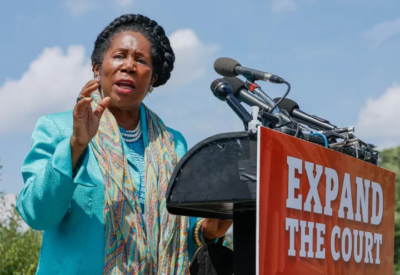 Rep. Sheila Jackson Lee Wants To Become The First Black Woman Mayor Of Houston. By Taylor S. Mitchell / HuffPost
Rep. Sheila Jackson Lee Wants To Become The First Black Woman Mayor Of Houston. By Taylor S. Mitchell / HuffPost
Rep. Sheila Jackson Lee (D-Texas) announced at church on Sunday that she’s looking to become Houston’s next mayor, the Houston Chronicle first reported.
“I hope I’ve been a humble servant for you for 28 years. Many of you are in my district,” Jackson Lee, who has served in Congress since 1995, said Sunday at City Cathedral Church. “Sheila Jackson Lee wants to come home to be your mayor for the city of Houston, and I will not be able to do it without each and every one of you.” Read more
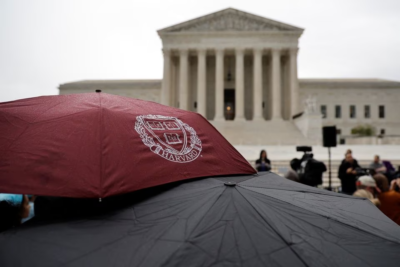 U.S. colleges face loss of racial diversity if race-conscious admissions banned, study shows. By Gabriella Borter / Reuters
U.S. colleges face loss of racial diversity if race-conscious admissions banned, study shows. By Gabriella Borter / Reuters
A person holds an umbrella with a Harvard logo print as demonstrators gather in support of affirmative action, as the U.S. Supreme Court is set to consider whether colleges may continue to use race as a factor in student admissions in two cases, at the U.S. Supreme Court building in Washington, U.S. October 31, 2022. REUTERS/Jonathan Ernst
If the U.S. Supreme Court bans the consideration of race in college admissions, enrollment of minority groups at selective colleges will likely stall or decline – even if the schools give more weight to factors such as class, a new study found. The conservative-leaning court will issue rulings this spring in cases questioning the legality of race-conscious admissions at Harvard and the University of North Carolina. Read more
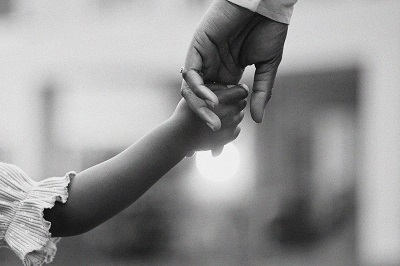 Autism now more common in Black, Latino children than white in the U.S. By AP and NBC News
Autism now more common in Black, Latino children than white in the U.S. By AP and NBC News
Experts attributed the change to improved screening and autism services for all kids, and to increased awareness and advocacy for Black and Hispanic families.
But the rate rose faster for children of color than for white kids. The new estimates suggest that about 3% of Black, Hispanic and Asian or Pacific Islander children have an autism diagnosis, compared with about 2% of white kids. That’s a contrast to the past, when autism was most commonly diagnosed in white kids — usually in middle- or upper-income families with the means to go to autism specialists. As recently as 2010, white kids were deemed 30% more likely to be diagnosed with autism than Black children and 50% more likely than Hispanic children. Read more
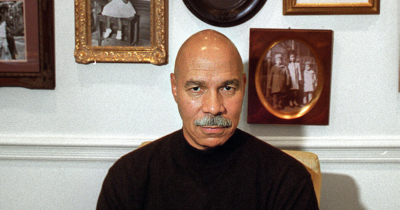 TransAfrica Founder Randall Robinson Dies at 81; Opposed South African Apartheid & U.S. Coups in Haiti. By Amy Goodman / Democracy Now
TransAfrica Founder Randall Robinson Dies at 81; Opposed South African Apartheid & U.S. Coups in Haiti. By Amy Goodman / Democracy Now
We remember the human rights activist and lawyer Randall Robinson, the founder of TransAfrica, who died Friday at the age of 81. Robinson played a critical role in the anti-apartheid movement in the United States and was a prominent critic of U.S. policy in Haiti. In 2004, he helped expose the U.S. role in the coup that ousted Haitian President Jean-Bertrand Aristide. We air excerpts from a 2013 interview Robinson did with Democracy Now! about his work. Read more
Ethics / Morality / Religion
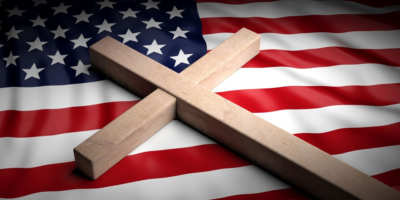 How Christian Is Christian Nationalism? By Kelefa Sanneh / The New Yorker
How Christian Is Christian Nationalism? By Kelefa Sanneh / The New Yorker
Many Americans who advocate it have little interest in religion and an aversion to American culture as it currently exists. What really defines the movement?
In contemporary America, though, the practice of Christianity is starting to seem abnormal. Measures of religious observance in America have shown a steep decrease over the past quarter century. In 1999, Gallup found that seventy per cent of Americans belonged to a church, a synagogue, or a mosque. In 2020, the number was forty-seven per cent—for the first time in nearly a hundred years of polling, worshippers were the minority. This changing environment helps explain the militance that is one of the defining features of Christian nationalism. It is a minority movement, espousing a claim that might not have seemed terribly controversial a few decades ago: that America is, and should remain, a Christian nation. Read more
Related: Christianity’s Place in the Left and the Right. By Daniel Steinmetz-Jenkins / The Nation
Related: The Global Transformation of Christianity Is Here. By Tish Harrison Warren / NYT
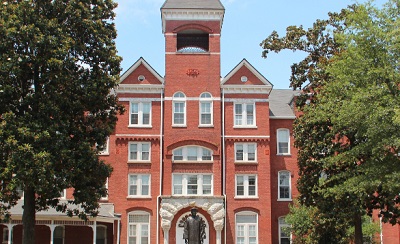 Morehouse College Is Giving a Peace Prize to the Prophet. The Church of Jesus Christ of Latter-Day Saints / News Release
Morehouse College Is Giving a Peace Prize to the Prophet. The Church of Jesus Christ of Latter-Day Saints / News Release
President Nelson to be honored for global leadership. Shown is Graves Hall, Morehouse College
Morehouse College, a historically Black college in Georgia, has announced today that it will give its inaugural Gandhi-King-Mandela Peace Prize to President Russell M. Nelson of The Church of Jesus Christ of Latter-day Saints. The school will bestow this new honor on the 98-year-old prophet on the evening of April 13, 2023, at the Worldhouse Interfaith and Interdenominational Assembly at the Martin Luther King Jr. International Chapel in Atlanta. Read more
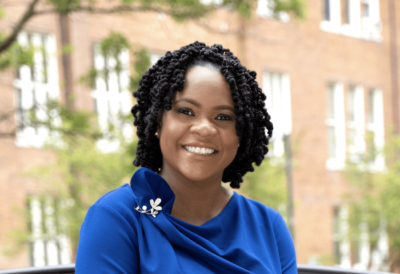 Public theologian Yolanda Pierce named next dean of Vanderbilt Divinity School. By Adelle M. Banks / RNS
Public theologian Yolanda Pierce named next dean of Vanderbilt Divinity School. By Adelle M. Banks / RNS
‘I look forward to building on the strong foundation that Emilie Townes and others have established to form this treasured community,’ Pierce said.
The Rev. Yolanda Pierce, dean of Howard University School of Divinity and a public theologian, has been named the next dean of Vanderbilt Divinity School. Her appointment is effective July 1, pending approval by the Vanderbilt University Board of Trust. “During the search process, Yolanda Pierce stood out for her outstanding national leadership at the intersection of religion and public life,” said Vanderbilt Provost C. Cybele Raver in a statement. Read more
Historical / Cultural
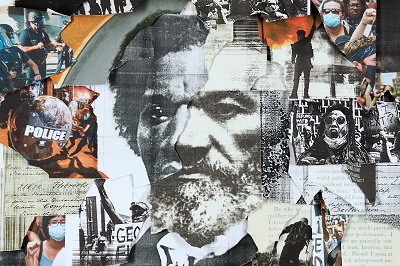 Grappling With the Overthrow of Reconstruction. By Eric Herschthal / TNR
Grappling With the Overthrow of Reconstruction. By Eric Herschthal / TNR
Two new books ask us to shift our attention away from the white vigilantes of Jim Crow and instead focus on what it meant for the survivors.
Kidada E. Williams’s wrenching new book, I Saw Death Coming: A History of Terror and Survival in the War against Reconstruction, examines the initial wave of racial terrorism that engulfed the South in the immediate aftermath of the Civil War. Like Williams’s I Saw Death Coming, Mari N. Crabtree’s My Soul Is A Witness: The Traumatic Afterlife of Lynching is less interested in the perpetrators than in the survivors. Crabtree, a professor of African American Studies at the College of Charleston, focuses on the ways survivors of post-emancipation lynchings passed down their stories through multiple generations—if they did so at all. Read more
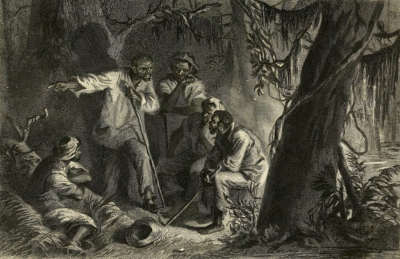 Slavery and Rebellion in Eighteenth-Century New Jersey. By Rann Miller / AAIHS
Slavery and Rebellion in Eighteenth-Century New Jersey. By Rann Miller / AAIHS
History of American conspiracies- a record of treason, insurrection, rebellion, and c., in the United States of America, from 1760 to 1860 (Wikimedia Commons)
Most Africans arrived in New Jersey from the Caribbean, and there was fear of acquiring Africans from there because it was believed they were more prone to rebellion. No matter where they arrived from, African people in New Jersey asserted sovereignty over their bodies. Enslaved African peoples often resisted by running away or sabotaging their captors by destroying tools, crops, or animals. Some enslaved persons engaged in violent retribution against their captors alone or in collaboration with captives like themselves. Read more
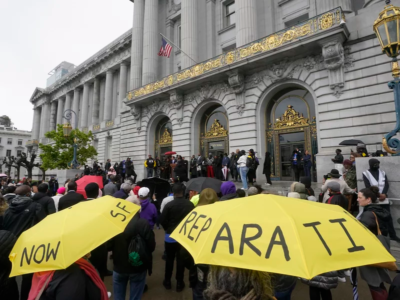 Why most Americans oppose reparations for slavery. By Jennifer Ludden / NPR
Why most Americans oppose reparations for slavery. By Jennifer Ludden / NPR
A reparations rally outside City Hall in San Francisco this month, as supervisors take up a draft reparations proposal. The growing number of local actions has renewed hopes and questions about a national policy. Jeff Chiu/AP
Local reparations programs — in about a dozen cities and the state of California — have renewed hopes for an eventual national policy to compensate for slavery. But after decades of lobbying and three years of a national reckoning over race, Americans overall remain strongly opposed to the idea. Read more
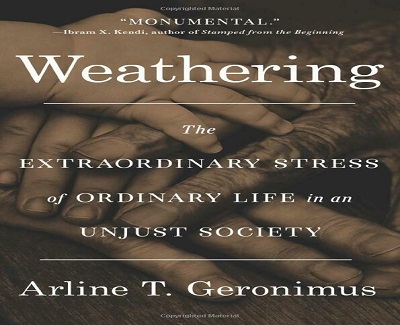 ‘Weathering’ makes the case that the stress of poverty and racism damage health. By Dave Davies / NPR
‘Weathering’ makes the case that the stress of poverty and racism damage health. By Dave Davies / NPR
Public health researcher Arline Geronimus from the University of Michigan says the traditional belief that the disparities are due to genetics, diet and exercise don’t explain data that’s accumulated over the years. Instead, she makes the case that marginalized people suffer nearly constant stress from living with poverty and discrimination, which damages their bodies at the cellular level and leads to increasingly serious health problems over time.
Geronimus coined a term for this chronic stress — she calls it “weathering,” which, she says, “literally wears down your heart, your arteries, your neuroendocrine systems, … all your body systems so that in effect, you become chronologically old at a young age.” She writes about the phenomenon in her new book, Weathering: The Extraordinary Stress of Ordinary Life in an Unjust Society. Listen and read more
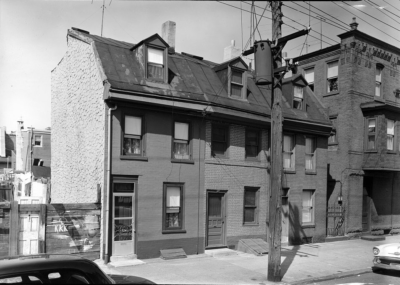 Black Homeownership Before World War II. By Menika Dirkson / AAIHS
Black Homeownership Before World War II. By Menika Dirkson / AAIHS
South Front Street House, Philadelphia, PA, (LOC)
Prior to World War II, middle-class African Americans began to move away from the slums and into adequate housing in all-white neighborhoods for a chance at a better life. However, racial outbursts of residential violence forced many African Americans back into the impoverished slums which they fought to avoid. Moreover, white residents’ belief in racist stereotypes of African Americans as prone to “poverty, crime, and sexual promiscuity” justified their resistance to desegregation with violence, restrictive covenants, and white flight.2 Read more
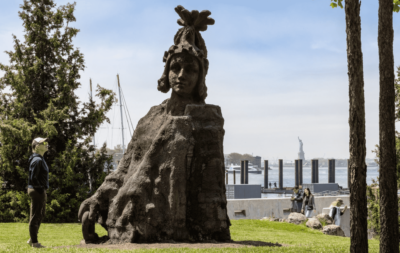 The Black Artists Claiming More Space Than Ever Before. By Emily Lordi / NYT
The Black Artists Claiming More Space Than Ever Before. By Emily Lordi / NYT
Credit…Courtesy of the artist and the Public Art Fund, N.Y. Photo: Nicholas Knight
New monumental works are filling landscapes and galleries, where they argue for the freedom and power to play. These works are monumental in every sense — in terms of the money, time, labor and space required to make them, as well as their social and technical ambition. Their creators, all of whom have worked in other media like painting and photography, describe them as manifestations of creative dreams; and the effect of encountering them can, as Williams notes of “Ruins,” verge on sublime. Read more
Sports
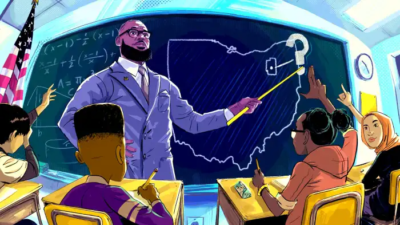 LeBron James’ promise to Akron gets more ambitious. By Justin Tinsley / Andscape
LeBron James’ promise to Akron gets more ambitious. By Justin Tinsley / Andscape
His I Promise School now includes housing, job training and health care
When LeBron James was in grade school, he wondered why the maps in his classrooms showed Cleveland, Cincinnati and Columbus, but not Akron. Now, 20 years into his NBA career, James is building a whole world in his hometown 40 minutes south of Cleveland, an audacious community revitalization project rooted in education while encompassing everything from housing and health care to job training and a laundry. Read more
 MLB The Show breaks barrier with Negro League players. By AP and NBC News
MLB The Show breaks barrier with Negro League players. By AP and NBC News
A digital rendering of Cuban baseball player Martín Dihigo from the game MLB The Show 23. Sony Interactive Entertainment via AP
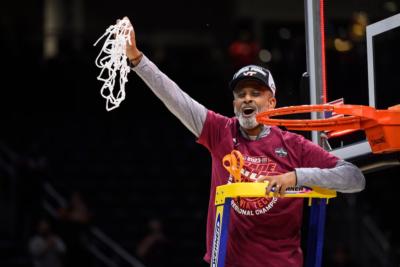 A Black man in the women’s Final Four, Kenny Brooks knows exactly who he is. By Jerry Brewer / Wash Post
A Black man in the women’s Final Four, Kenny Brooks knows exactly who he is. By Jerry Brewer / Wash Post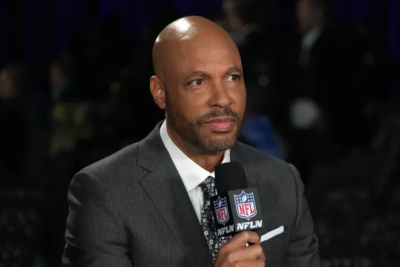 NFL Network’s treatment of Jim Trotter shows NFL fails on race issues. By Mike Freeman / USA Today
NFL Network’s treatment of Jim Trotter shows NFL fails on race issues. By Mike Freeman / USA Today